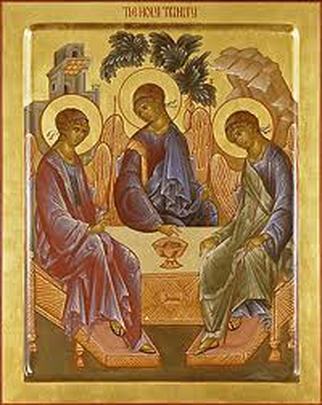 Though we may not articulate it as such, one thing we all seem to want is to have unity. But unfortunately, underlying our desire is the temptation to think (not always secretly) that if everyone would only see things our way we would indeed have unity. The reason for this is simple: in our own mind, even if unconsciously, we think our way is the best way. What is so ironic about this thought is that it is precisely why we have disunity. However, let us not be dismayed at this conundrum wrought by our humanness. If we truly look at it, our desire for unity is actually a desire for God. I say this because God is the truest unity: God is three Persons, but yet there is only one God. When we desire unity we are seeking the oneness found in the Holy Trinity. The only antidote for our dilemma of desiring unity while living with so much plurality is to find our unity in God. God is the healer of all that is broken and the unifier of all that is divided because in His essence God is an undivided unity of Three in One. Actually, plurality and diversity are good things. In no way is being in unity a negation of our diverse gifts or a denial of the importance of having differing ways of approaching problems or tasks. Unity does not mean sameness. As a people we are a work in progress and so we should always seek to use our creativity and to bring unique ideas to the table. As St. Paul pointed out, we are many parts of the Body of Christ, each with differing gifts. But the point is that we respect and use each gift in order to make a whole, not for one part of the body (to use his analogy) to lord it over any other part or to be seen as having more propriety than any other. (1 Cor 12) There is no unity in such attitudes and that is why we can become at odds with one another. The goal, therefore, is to find ways to complement each another and to use our diverse gifts toward the good of the whole community. It seems like an elusive goal because we are indeed broken, but that does not mean we should not try to work toward it. In fact, working toward personal wholeness is what we are all called to do; it is what we call ‘holiness.’ And if we all work toward it individually, we can find unity as a community. 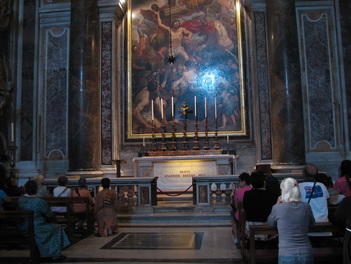 In last Saturday’s (daily Mass) liturgy the first reading stated, “The fervent prayer of a righteous person is very powerful.” (James 5:16) If we use the present moment, the only reality we truly have, in order to pray and discern, we will come to see how we can best use our gifts. The wholeness we desire for ourselves will spill over into the work we do because that is how holiness works. As people come closer to God, they start to do the things that are Godly. They start to imitate Christ by using the love which the Spirit gives them, (grace), in all they say and do. Our fervent prayer therefore, includes prayer for others which leads us to action. To do this, we have to become attentive to how the Holy Spirit moves within us. As St. James said, if we are suffering we should pray; if we are in good spirits we should sing a song of praise; if we are sick, we should ask to be prayed over and anointed in the name of the Lord. (James 5:13-14) In other words, if we are attentive to the present moment, bringing our focus on the challenge at hand rather than longing to be somewhere else, our prayer becomes quite powerful indeed. 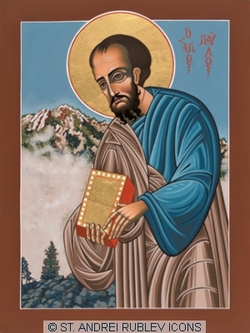 The one longing to be elsewhere that we should have, however, is the longing for Heaven. But we cannot forget that we have to be here first, attending to the people and the tasks which have been given us. St. Paul wrote of his struggle with a ‘dual longing’ in his letter to the Philippians. He wrote: “For to me life is Christ, and death is gain. If I go on living in the flesh, that means fruitful labor for me. And I do not know which I shall choose. I am caught between the two. I long to depart this life and be with Christ, [for] that is far better. Yet that I remain in the flesh is more necessary for your benefit.” (Phil. 21-24) Like most people of faith, St. Paul longed for Heaven so that he would be united with God, yet he knew God had a purpose for him to fulfill here. Therefore, he chose to do what was most pleasing to God, knowing that eventually he would be with Him in Heaven. 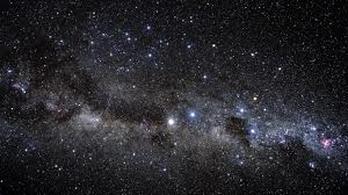 Paul’s struggle sheds light on why we find unity so elusive: often we would rather do things our way than God’s way. Quite honestly, God’s way is incredibly mysterious much of the time, and it can be frustrating as we try to discern the way we are to proceed. There is so much disunity in this world, so many voices clamoring for our attention, so many varying opinions, that we can easily become confused, or worse still, jaded. But if we cling to the Holy Trinity, an undivided unity, can we find peace. The mistake we make which inadvertently ends up putting us off course is that we try to understand the mystery of who God is and how everything works rather than simply trusting in Him. Trying to understand the mystery of God is like trying to understand the universe: it is too vast, too far beyond us, and it is infinite. We can try to unravel its mysteries, but the more we discover, the more we realize we do not know. And so, as in understanding the universe or any other mystery, we must be content in accepting that try as we might, we will never understand God completely, at least not in this life. And for this reason, we truly need to trust the Holy Trinity who alone can guide us through all that mystery. Our one God has revealed Himself as a Trinity, a unity of Love. Jesus, the Son of God, said to His disciples that He and the Father are one (John 10:30) and He also spoke of His Holy Spirit which was to come into the world at Pentecost, as celebrated last week. In the gospels we ‘witnessed’ all three Persons as they manifested together at Jesus’ baptism and at His Transfiguration. Even so, we will never understand how it is possible; it is an absolute mystery. Therefore it is not a good idea to wrestle with trying to understand that which is too far beyond us. Instead, we need to turn to God Himself, the undivided Trinity, as a source of wholeness and unity, and simply rest in Him and in His love. We can pray as St. James taught, trusting that our fervent prayer is powerful. We can ask for the graces only God can give that we may be more whole ourselves and that we may be a peaceful presence rather than a divisive one. We can call upon the Lord to heal that which is too big for us and which divides the world, trusting that in the end our Triune God will pull all the broken pieces into Himself, healing us as He brings the ones who persevere into the Kingdom of Heaven, the fullness of His love. 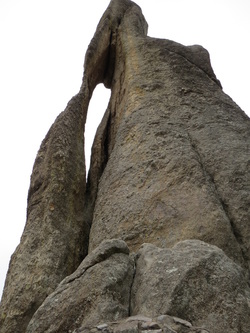 We cannot heal the world ourselves. We can only rely on God to do what is impossible for us. The Father created the cosmos, and in a tiny corner of it He created humans; we were originally created in wholeness, but our participation in sin shattered the unity. Subsequently, He sent His Son Jesus to bring healing, wholeness, and salvation through His dying and rising. And He sent the Holy Spirit after Jesus ascended into Heaven that we might have greater access to the graces we need in order to persevere in our journey toward God, helping others to also come to know God, the Holy Trinity. It is in embracing the mystery of our One God in Three Persons, who is Love and who offers Love to us, that we find hope. The point to our lives is not to understand, but rather it is to trust in God, the undivided Unity for whom we all long. And in this trust we can rest in Him, the One who is Love, so that all that is divided may become one in Him. Let us praise God, the Holy Trinity, for all the blessings He bestows! May we have the healing and wholeness for which we long! May we trust in God that all which is divided will be eventually united in Him! May we give glorify and praise to the Holy Trinity in our fervent prayer and in our work to bring others to Him! May we be content in the mystery of God as we rest in His love! May we give praise to the Father, give glory to the Son, and gratitude to the Holy Spirit, one God in three Persons! And may we seek to rest in God, not alone, but with the community who is the Body of Christ! Let us meet in heart of the Holy Trinity! Peace! ©Michele L. Catanese Note: As happens so often for me, the inspiration behind this entry was inspired by a song, a hymn I grew up with called “O God, Almighty Father.” The refrain goes like this: “O most Holy Trinity, Undivided unity, Holy God, mighty God, God immortal be adored.” The first image is what is undoubtedly one of the most famous and well-known icons in the world, St. Andrei Rublev's Holy Trinity. The Father, Son, and Holy Spirit are depicted as the three 'angels' who visited Abraham in the Old Testament passage. I chose it because it truly is an inspiring work with the Trinity sitting in the garden, a representation of that which God has made in creation, at prayer and rest, the Son pointing to the cup as if to say it is His body and blood which will be poured out for us. Exquisite! Next is a photo I took at St. Peter's in Rome. The people are praying before the tomb of St. John Paul II. He was someone who pointed all of us to prayer through teaching and example during his pontificate. But even more important was how St. John Paul was so courageous in inspiring people to rise to the challenge at hand, finding even the gift of one's own diminishment through sickness or age to be something one can offer. Next is an icon by Fr. William Hart McNichols called St. Paul the Apostle. In it one can see how St. Paul is carrying the gospel message far and wide, as implied by the beautiful book in his hands and the mountains in the background. St. Paul longed for Heaven, as every Christian should, but he also knew he had been given gifts in order to spread the gospel. He is depicted as lovingly, but resolutely, carrying the Word of God, because that is what Jesus has asked of him. I love how that can be seen in this icon. It can be found at http://fineartamerica.com/featured/st-paul-the-apostle-196-william-hart-mcnichols.html. Next is a NASA photo of multitudes of stars, beyond counting, in the night sky. I think it speaks for itself of the vastness and mysteriousness of the universe. I could stare at the night sky forever and recommend finding somewhere without 'light pollution' to do so, too. It is magnificent. Next is a photograph I took while in the Black Hills of South Dakota. I chose to use this here because of the unity of the rocks. If you look really closely you will see that the cut-out in the rock is heart shaped. It made me think of the Trinity, the Father, Son, and Holy Spirit who are "an eternal exchange of love extended out to us." (slight paraphrase of the words of St. Augustine.) Comments are closed.
|
Heart Speaks to Heart
|

 RSS Feed
RSS Feed

